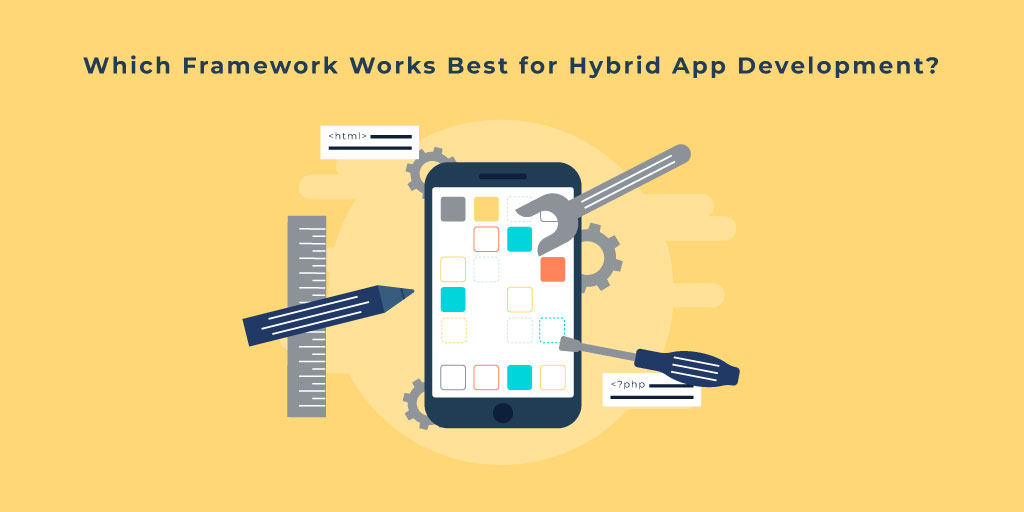
Nowadays, businesses are looking forward to having Hybrid App. The reason behind this is it allows them to scale up their market reach. Thus, to offer flexibility in terms of usage by consumers choosing Hybrid App Development is the wise decision any enterprise can make.
Hybrid App development uses technologies such as HTML, CSS and JavaScript but is encapsulated in a native-like container. This makes the application flexible to run on every operating system like iOS, Android and Web. It offers the advantage of using a codebase written once, or multiple times for various platforms. Eventually, saving hours of manual coding, resources, time and effort. Additionally, the choice of hybrid app development also reduces the maintenance cost and updates for different platforms.
Though to leverage all these mentioned advantages of choosing a hybrid application development service, it is also essential to know about the frameworks. Here, this article provides a brief on the importance and way of making a decision for a framework to start the development task.
Choosing Hybrid App Development Framework
Framework selection is an essential task for app development. And, it is necessary to consider aspects for making the decision to implement in the developing task. Know what are the factors to make a choice.
Features of Platform
Distinct frameworks have different features. Therefore, for every platform, it becomes imperative to understand the compatibility of the framework with desired functionalities. This will help in the implementation to develop an application that runs smoothly on every platform.
Code Reusage
The hybrid framework makes code reusability easy. However, some do not allow the utilisation of this feature. Therefore, make sure to check the efficiency of code reusability of the framework to make the application run seamlessly, irrespective of the operating system.
Convenience
To find convenience, it is better to be prepared with documentation, project samples and resources. This helps in determining the most suitable hybrid app framework. It also accelerates the process and also shortlisting programming languages.
Pricing
Undoubtedly, the project cost matters. Therefore, while adding a framework type to the development documentation, it is necessary to take note of pricing plans. These range from free to licensing models, which gives flexibility to small to large running operations enterprises.
Considering, all the above factors it still sometimes gets challenging to make a choice. Multiple frameworks will perfectly satisfy the above conditions. Henceforth, to make the selection easier for enterprises, here we are listing some popular hybrid app frameworks of 2023.
Hybrid App Development Framework for 2023
React Native:
This framework still dominates the hybrid app development landscape in 2023. It is backed by Facebook and offers a robust and mature framework for building cross-platform apps. With its rich ecosystem and extensive community support, developers can create high-performance apps that feel native on both iOS and Android devices. Its frequent updates and constant improvements ensure it stays at the forefront of hybrid app development.
Flutter:
In 2023, Flutter, developed by Google, remains a strong competitor to React Native. Offering a single codebase for iOS and Android, Flutter enables developers to build visually appealing and fast apps. Its emphasis on a reactive UI and hot reload feature speeds up the development process, making it an attractive choice for businesses seeking rapid prototyping and quick deployment.
Xamarin:
Microsoft’s Xamarin remains relevant in 2023 as a popular hybrid app development framework. Using C# and .NET, developers can build cross-platform apps with native-like performance. Its integration with Visual Studio and Microsoft services simplifies Windows, iOS, and Android development. While facing competition from React Native and Flutter, Xamarin remains a solid choice for enterprises invested in the Microsoft ecosystem.
In conclusion, selecting the right hybrid app development framework is crucial for building successful applications. Consider factors like platform compatibility, code reusability, convenience, and pricing. React Native, Flutter, and Xamarin are popular choices for 2023, each offering unique advantages. Make an informed decision to ensure a seamless and cost-effective development process.
For your assistance, here is the recommendation for a reputed and known industry name TechRev. Their expert team has hands-on experience in developing Hybrid Apps considering business requirements. The solution they develop has the potential to scale up businesses’ growth and customer reach. By utilising various frameworks, different programming languages & advanced technology, the team has delivered an apt application to multiple industries.
Thus for your app ideas, connect with the TechRev team!
